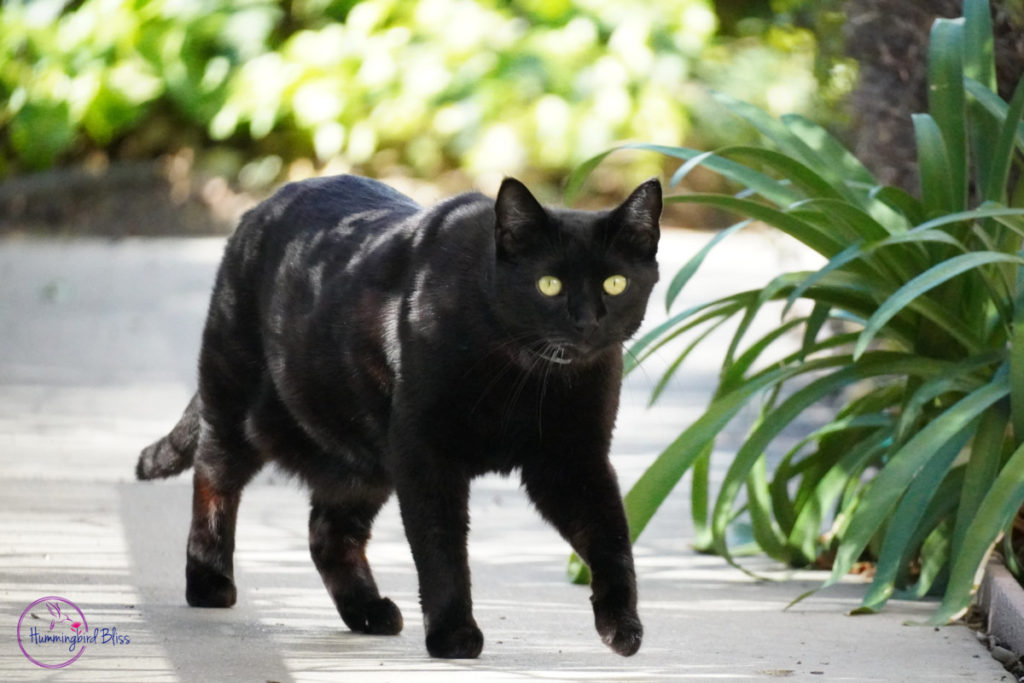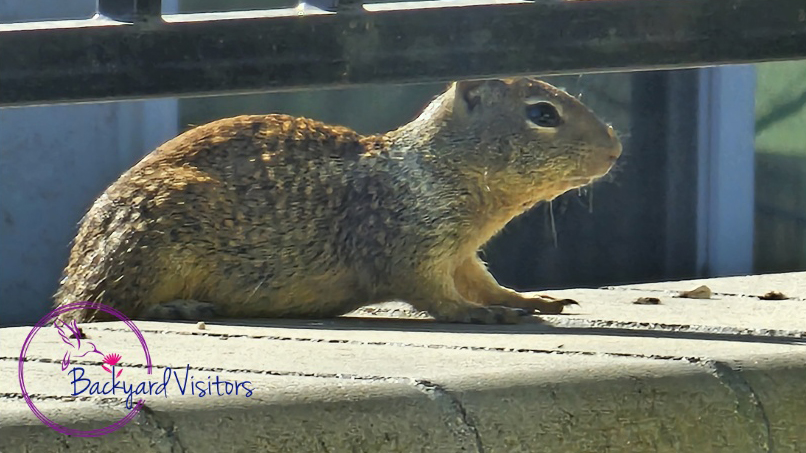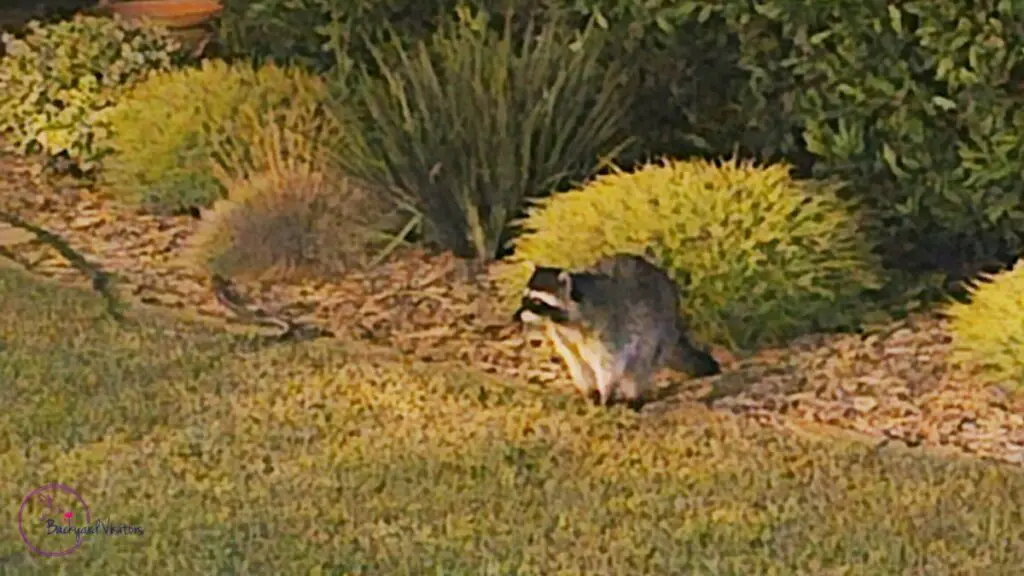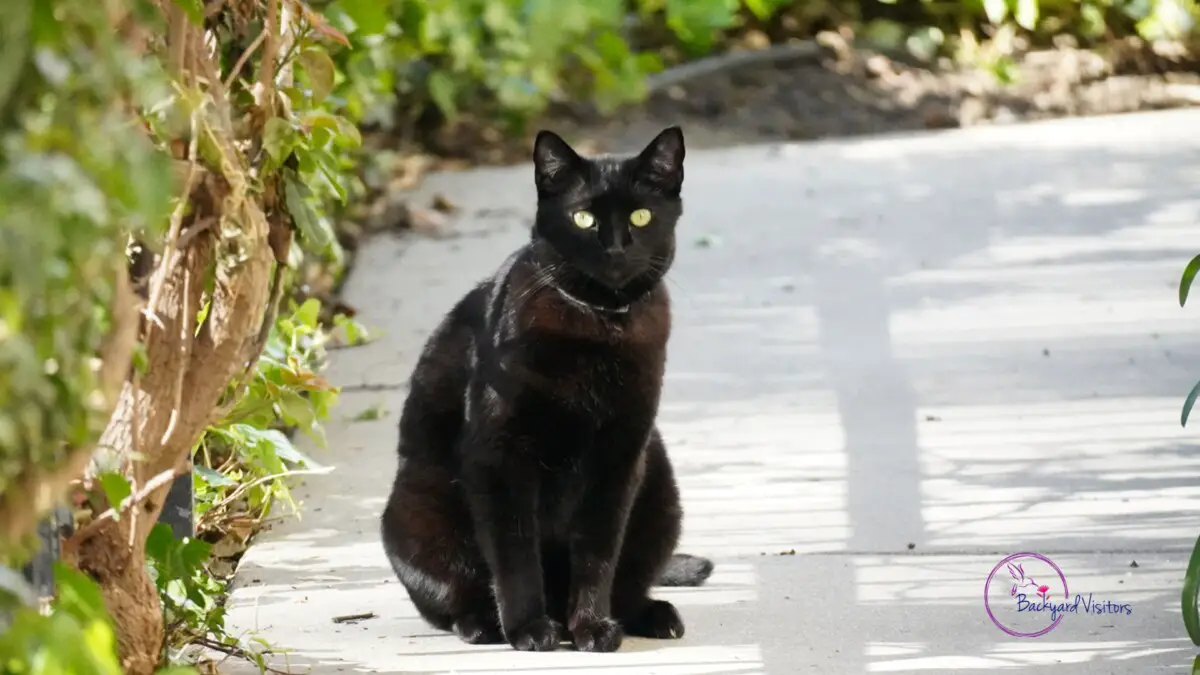This post contains affiliate links.
In this post, we will explore the top seven animal predators of hummingbirds that eat their eggs, hatchlings, and even adults.
Hummingbirds have multiple animal predators besides the typical cat that can eat them as a delectable treat.
The interplay between hummingbirds and their predators adds a layer of complexity to the avian ecosystem, underscoring the intricacies of survival and predation in the natural world.
What Animals Eat Hummingbirds?
Animals that eat hummingbirds include:
- Cats
- Squirrels
- Chipmunks
- Raccoons
- Skunks
- Rats
- Coyotes
Do Cats Eat Hummingbirds?
Cats, both domestic and feral, are the most common predators of hatchlings, fledglings, and adult hummingbirds. Due to their predatory instincts and as natural hunters, they chase, catch, and eat hummingbirds.
All cats, both domestic and feral, are the number one predator of hummingbirds. Cats will eat hummingbirds if they have an inkling of hunger and if given a chance. Cats are intrigued and enticed by the hummingbird’s movements and will also chase them for play.
Most cats can jump vertically up to 5 feet off the ground, while some can jump up to 8 feet. To attack, they can also leap from a fence, a tree branch, a rooftop, or another high place. Depending on the age and physical condition of the cat, its top speed can reach 30 mph. They are able to run, jump, and catch a hummingbird for food or play using their powerful rear muscles.

Hummingbirds, with their small size and quick movements, are tempting targets for cats. If a cat manages to catch a hummingbird in its mouth, it may sometimes kill and eat it or simply catch and play with it.
To learn more about cats as hummingbird predators, see my article: Can a Cat Catch a Hummingbird?
To help protect hummingbirds from cats, it is suggested to hang the feeders at least five feet above the ground. This not only keeps the birds safe but also makes it harder for sneaky cats to surprise the hummingbird. If you have a domestic cat and want to keep enjoying the company of these little birds, it’s best to keep your feline friend indoors.
If you have hummingbirds in your area and want to protect them from potential cat predation, take measures by elevating the placement of your feeder, confining your cat as an indoor domestic cat, or supervising them while they are outside. These options are advocated to mitigate risks and help ensure the safety of both the hummingbirds and your cats.
See my article: 10 Common Things That Kill Hummingbirds
Do Squirrels Eat Hummingbirds?
Squirrels can and do eat hummingbirds. More commonly, they will eat hummingbird eggs and hatchlings. Less frequently, if they are able to catch an adult hummingbird, they will eat it also.
Squirrels are opportunistic animals. They will eat hummingbirds, their eggs, and babies as consistent with omnivorous feeding behaviors. However, this habit is less common and more likely to occur when squirrels are faced with limited food sources or extreme conditions.

If a squirrel comes across a vulnerable or injured hummingbird, it might attempt to consume it for a nice treat. It might sound surprising since squirrels primarily target nests, they have grabbed low-flying hummingbirds as a quick meal.
In general, squirrels do not pose a significant threat to hummingbirds. Hummingbirds are highly agile and quick, making them challenging for squirrels to catch. Additionally, hummingbird feeders are often designed to be difficult for squirrels to access, reducing the likelihood of interactions between the two species.
If you’re concerned about squirrels potentially bothering your hummingbirds or their feeders, you can take measures to squirrel-proof your setup by using specialized feeders and placing them in locations that are difficult for squirrels to reach.
Next time you spot a squirrel and a hummingbird in your backyard, you’ll have a little insider knowledge about their dynamic relationship.
Do Chipmunks Eat Hummingbirds?
Chipmunks do eat hummingbirds, primarily hummingbird eggs and hatchlings. Chipmunks are not known for targeting hummingbirds as a primary food source but will eat them if an opportunity arises or food sources are scarce.
They are omnivores; eating both plants and animals.
Hummingbirds encounter various predators in their ecosystem and chipmunks are on the list of animals that eat hummingbird eggs, hatchlings, or even adults if they can catch them.
In regard to adult hummingbirds, the agile acrobatic movements of chipmunks sprinting, leaping and climbing help them to surprise their target before they consume a quick easy meal.
Chipmunks might look charming, however, they can create a bit of a challenge for people who adore attracting hummingbirds to their yards.
To safeguard hummingbird nests, limit access to their favorite food sources, such as bird feeders and piles of seeds. Use Hot Pepper Bark Butter to deter chipmunks as they do not like anything hot or spicy. Adding physical barriers around birdhouses and nesting spots can also suspend exploration. Other ways to discourage chipmunks are to trim greenery so that it is close to the ground and add motion-activated sprinklers.
Do Racoons Eat Hummingbirds?
Raccoons do eat hummingbirds. During the day, hummingbirds are not usually vulnerable as raccoons are primarily nocturnal feeders. Raccoons are opportunistic and resourceful omnivores, eating both plants and animals.
Raccoons are intelligent, clever, skilled, and persistent animals when foraging for food. Their omnivorous nature is primarily active during the night. This drives them to seek food, potentially targeting feeders for nectar, hummingbird eggs, hatchlings, and adult hummingbirds in torpor.
Raccoons have excellent night vision and other sensory adaptations which help them navigate and hunt in the dark.

before he ran out into the backyard. He was a big one!
Raccoons are known to explore bird feeders in search of food. If they find a hummingbird feeder they might attempt to access the sugar water.
Raccoons’ adept climbing skills and nocturnal habits enable them to locate and access food, including the sleeping residence of a hummingbird nest.
To learn more about hummingbirds’ sleeping patterns, see my three articles:
Discovering Hummingbirds After Dark: (Where they Sleep)
Moonlit Magic: Baby Hummingbirds at Night
Hummingbird Slumber: The Secret to Conserving Energy at Night
A way to discourage raccoons from raiding hummingbird nests at night is to proactively remove the feeders near a nest, thereby deterring and preventing raccoons from locating it.
Other ways to prevent these nocturnal creatures from accessing hummingbird feeders and eating hummingbirds are to hang feeders at an elevated height that is difficult for raccoons to reach, use raccoon-proof baffles or barriers, bring the feeders inside at night, and regularly clean and maintain the feeders. This will help ensure the safety of the hummingbirds and their nectar source.
Do Skunks Eat Hummingbirds?
Skunks do eat hummingbirds. They are omnivores and hummingbird eggs, hatchlings, and even defenseless adult hummingbirds can be part of their diet. They are scavengers who hunt for readily available food.
Skunks consume insects, eggs, and small birds like hummingbirds, but hummingbirds are not a common or essential part of their diet.
Skunks are more prone to target fruits, plant materials, and ground-dwelling animals. They are scavengers and have a good sense of smell.
Skunks are not excellent climbers, but they can climb trees. A hummingbird that would most likely be eaten by a skunk would be a vulnerable injured adult or a hatchling that has fallen out of the nest.
In general, skunks are not a significant threat to hummingbirds.
Do Rats Eat Hummingbirds?
Rats do eat hummingbirds, their eggs, and also the hatchlings. They are most vulnerable to rats at night when the hummingbird or hatchlings are in torpor. Rats can and do climb trees.
While adult hummingbirds are small and agile, they can still be vulnerable to predation by animals, including rats, especially if the hummingbird is caught off-guard or in a compromised situation.
Rats are opportunistic omnivores and will consume a wide variety of foods, including insects, small birds, and hummingbird eggs.
In some cases, rats might be attracted to hummingbird feeders. It’s important to take measures to prevent such predation, such as:
- Placing feeders in locations that are less accessible to rats or other predators.
- Adding a rat guard to the hummingbird feeder.
- Keeping the hummingbird feeder area free of debris, other food that attracts rats, and convenient hiding spots near the feeder.
Rats are nocturnal omnivores and are capable climbers that can climb trees. This skill makes a mother hummingbird, sitting on her nest in torpor, a potential target to be eaten by a rat, along with her eggs or babies.
While they may not be as agile as some other animals, such as squirrels, rats have adapted to various environments and can use their sharp claws and strong tails to help them climb. In some urban and rural settings, you might find rats climbing trees in search of food, shelter, or to escape predators. However, their climbing abilities can vary based on the specific species and the environment they inhabit.
Do Coyotes Eat Hummingbirds?
Coyotes do eat hummingbirds as they are opportunistic omnivores with a preference for the carnivore portion of their diet. However, hummingbirds are small, agile, and difficult to catch creating an inconsistent food source for coyotes.
Coyotes are scavenger omnivores eating a variety of plants and animals depending on what is available in their environment.
While their primary diet consists of small mammals like rodents and larger birds there have been instances where coyotes have been observed eating hummingbirds.
Compared to larger prey, hummingbirds are quick and energetic making them difficult to catch, therefore they do not provide a common food source for coyotes.
Coyotes are known to adapt to different food sources based on what’s accessible to them as they will consume hummingbirds if the opportunity arises.
What is the best way to protect backyard hummingbirds from animal predators?
The best way to protect backyard hummingbirds from animal predators is to have a domestic dog in the backyard.
During the many years we had our dog Sammie, we had few predator problems. Every morning he would scout out his property and mark his territory by leaving his scent and signalling to all other animals to keep out of our backyard.

Best dog ever!
Check out my other posts on Hummingbird Questions
Happy Preditor-Free Hummingbird Watching!
Backyard Visitors participates in affiliate programs which compensate us for referring traffic.


